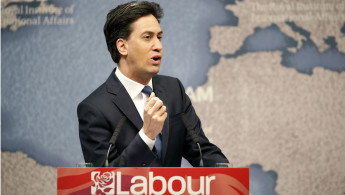Labour leader Ed Miliband spoke at Chatham House, a London-based foreign policy think tank [AFP]
British Labour Party leader Ed Miliband has accused Prime Minister David Cameron of weakening the standing of Britain on the world stage with an isolationist foreign policy and uncertainty about membership in the European Union.
In a speech on Friday that brought international affairs into Britain's election campaign, Miliband said Cameron's failure to plan for post-Gaddafi Libya had contributed to the North African country's descent into chaos.
"What we have seen in Libya is that when tensions over power and resources began to emerge, they simply reinforced deep-seated ideological and ethnic fault lines in the country, meaning the hopes of the revolutionary uprisings quickly began to unravel," Miliband said.
"The tragedy is this could have been anticipated. It should have been avoided."
His statements come after 800 migrants, including children from the Middle East and Africa, died when their boat capsized off the coast of Libya on Sunday - the worst in a series of migrant shipwrecks in recent years.
European leaders have been accused of callous disregard for the lives of migrants.
But after an an emergency EU summit on Thursday, Cameron pledged UK military assets to boost search and rescue efforts in the Mediterranean, with leaders agreeing to triple funding for search and rescue efforts.
"Britain could have played its part in ensuring the international community stood by the people of Libya in practice rather than standing behind the unfounded hopes of potential progress only in principle," Miliband said in his speech.
"Cameron was wrong to assume that Libya's institutions could be left to evolve and transform on their own," following military action to oust former leader Muammar Gaddafi, the Labour leader added.
Conservatives reacted angrily, accusing Miliband of blaming Cameron for the deaths of migrants, with Cameron calling the Labour leader's remarks "ill-judged".
When asked if he was directly pinning the blame on Cameron, Miliband said the Conservatives were trying to "whip up a storm".
"Nobody can disagree with the idea that the failure of post-conflict planning has been responsible for some of the situation we see in Libya and indeed people then fleeing," Miliband told the BBC.
International conflicts
"Today, we face failed states and civil wars across the entire wider Middle East region - from the western Sahel through to Somalia and Sudan, from Yemen to Syria and Iraq, and in both Afghanistan and Pakistan," Miliband said in his speech, adding that all of these "mattered for the UK".
"These conflicts are already spilling over into Europe through terrorism, growing illegal migration, organised crime - and all these will worsen if the conflicts intensify," he said.
The Labour leader called for protection of borders and to build partnerships abroad.
Miliband also pressed on the threat posed by the Islamic State group (IS, formerly known as Isis), stating that military action alone would not defeat the group.
"Following a request from the Iraqi prime minister, it was right that the UK joined other nations in airstrikes against IS targets in Iraq."
But Miliband also called for "robust controls" to prevent people travelling to take part in the Syrian conflict and to ensure those returning are properly "managed".
The Metropolitan Police counter-terrorism unit believes that 600 Britons have travelled to Syria and Iraq to join Islamic State group fighters.
"A long-term multinational political strategy, with regional actors playing a central role, is essential to tackle the rise of extremism across the region," he said.
Two-state solution
The opposition leader also spoke on his policy towards Israel and the Palestinians.
"We must step up our efforts to help bring about the two-state solution in Israel and Palestine that is desperately needed," he said.
Calling it a conflict that "scars the region", he called for a "secure Israel alongside a viable and independent state of Palestine".
"There can be no true stability in our world without its resolution," Miliband said.
The Labour leader's speech received a mixed response on Twitter:





 Follow the Middle East's top stories in English at The New Arab on Google News
Follow the Middle East's top stories in English at The New Arab on Google News

![Israeli forces ordered bombed Gaza's Jabalia, ordering residents to leave [Getty]](/sites/default/files/styles/image_330x185/public/2176418030.jpeg?h=a5f2f23a&itok=_YGZaP1z)
